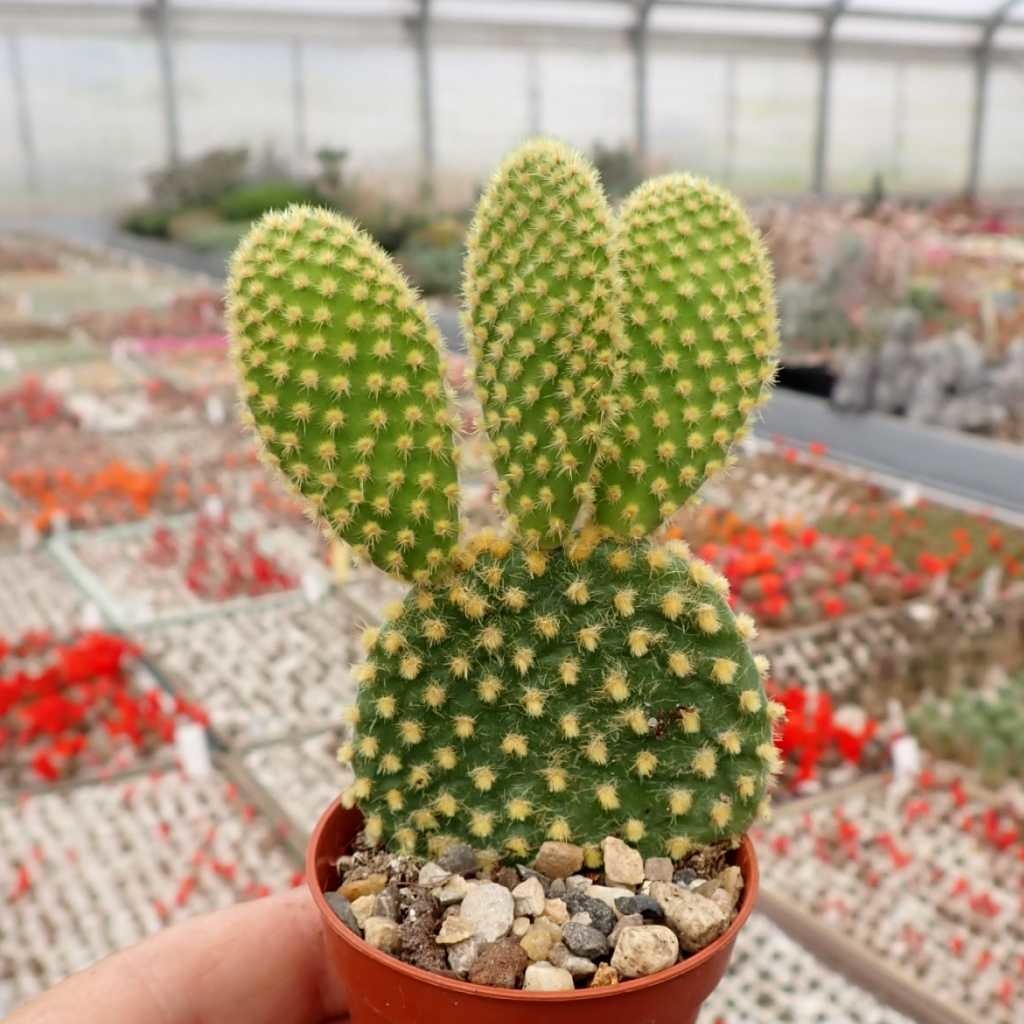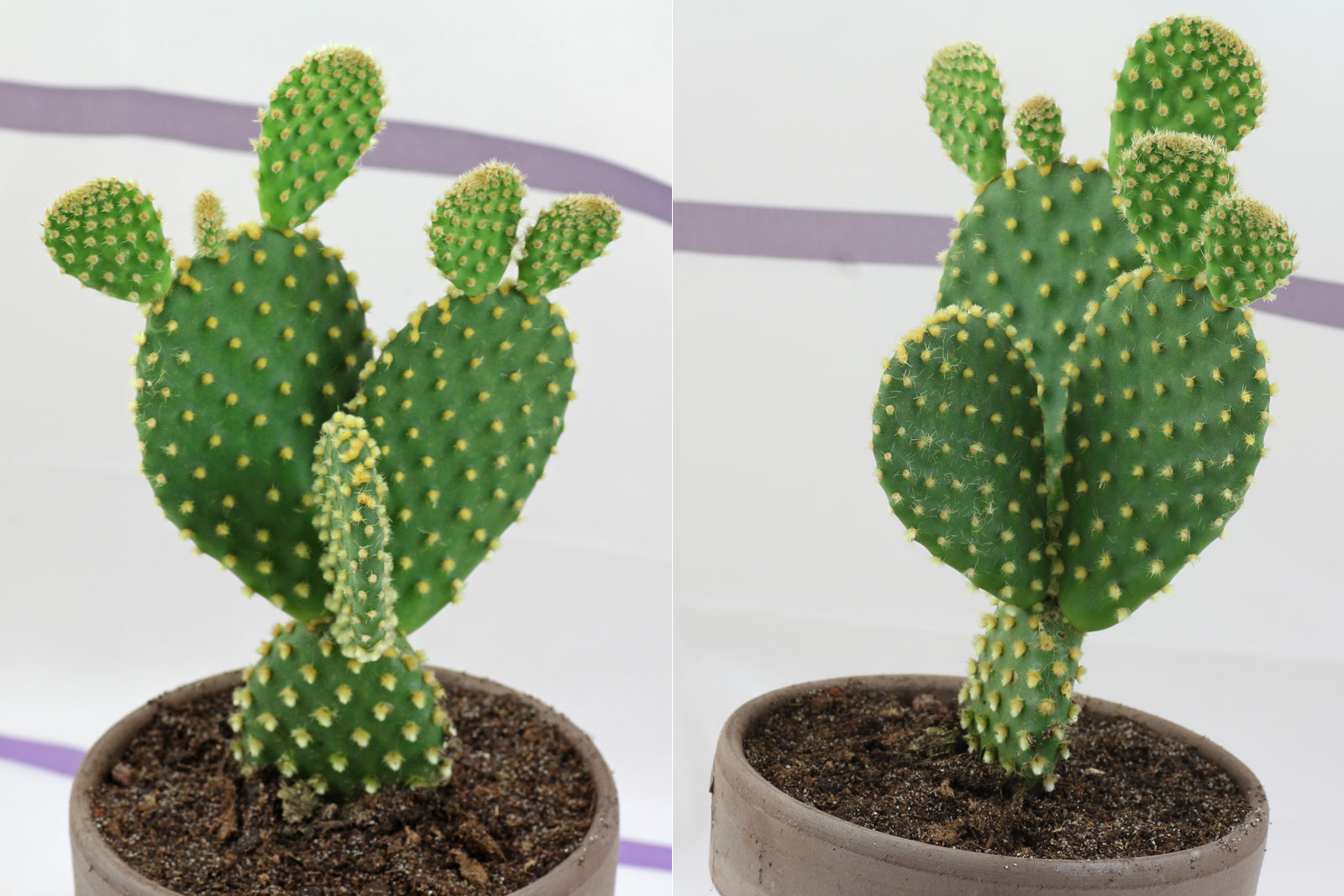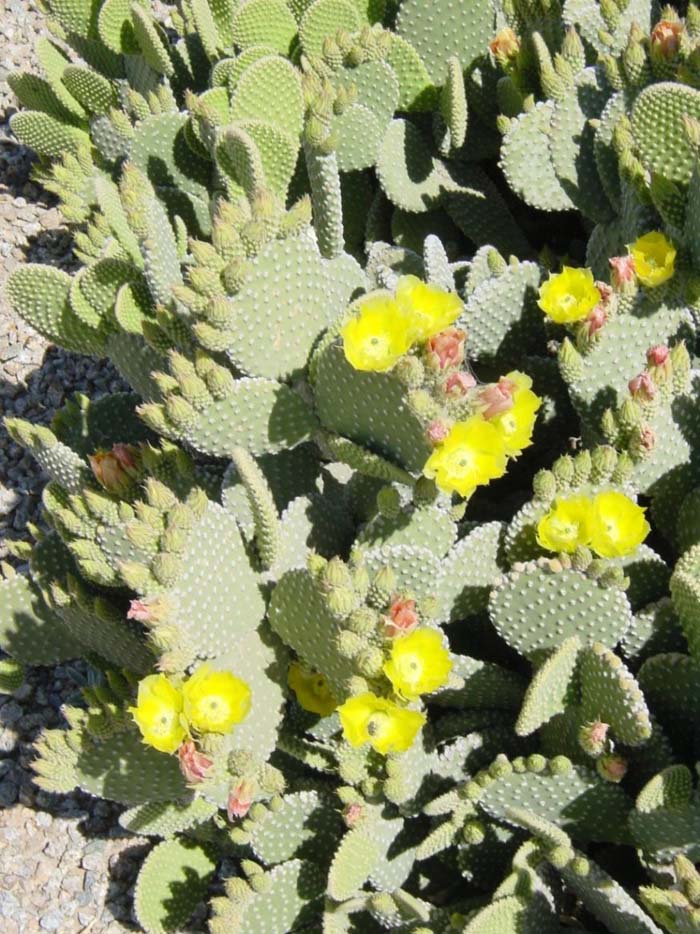
Opuntia microdasys, Cactus plants, Horticulture
Opuntia microdasys blooms are bowl-shaped, red-tinged or with pure yellow flowers. The flowers are relatively large (around 2" inches wide in diameter). They turn into red or purple 2" inch long fruits. Light & Temperature. These plants are hardy to USDA Hardiness Zones 8-12. In these regions, Opuntia thrives in bright full sun while also.

Opuntia microdasys Succulents Pinterest Opuntia microdasys, Cacti
The easiest way to propagate Bunny Ear cactus is by cuttings. First, cut a section of the pad along the width and wait a day or two for it to dry over. Next, dip the cut end in rooting hormone (available at most garden stores), then place the cutting in the potting mix. Keep the potting mix moist until the cutting roots.

Opuntia microdasys (Angel'sWings, Bunny Ears, Polka Dot Cactus
Opuntia microdasys or bunny ears cactus is a flowering plant from the Cactaceae cactus family and indigenous to Mexico, with cactus enthusiasts distributing and cultivating in many different places and climates. It is a dense shrub that grows to 2ft high and 3ft wide, growing 3ft tall in the wild, and is made of succulent pads or flat stems.

Opuntia microdasys Uhlig Kakteen more than 5,000 different species
The Bunny Ear Cactus, scientifically known as Opuntia microdasys, is a distinct and fascinating succulent, beloved for its unique appearance and low-maintenance nature. This guide delves into the essentials of growing Bunny Ear Cactus, with a special focus on propagation and soil requirements, ensuring enthusiasts can cultivate this charming plant with confidence and success.

Opuntia_microdasys Giromagi Cactus and Succulents
Opuntia microdasys is an evergreen Perennial growing to 0.6 m (2ft) by 0.6 m (2ft in). See above for USDA hardiness. It is hardy to UK zone 8 and is not frost tender. It is in leaf all year, in flower from July to August. The species is hermaphrodite (has both male and female organs) and is pollinated by Insects. Suitable for: light (sandy) and medium (loamy) soils and prefers well-drained soil.

opuntia microdasys ssp. rufida Opuntia microdasys, Succulents, Cacti
Opuntia microdasys, commonly known as Bunny Ear Cactus, has flat, pad-shaped stems that can grow up to 45 cm long and 15 cm wide. These pads are covered in small, golden spines called glochids, which can cause skin irritation and are difficult to remove.

opuntia microdasys, opuntia, tavşan kulağı, bunny ears, sukulent
Opuntia microdasys is a popular cactus that forms a dense shrub with green pad-like stems with no spines but numerous yellow glochids at each areole. It grows up to 3 feet (90 cm) tall and up to 6 feet (1.8 m) wide. Stems are oval to round, up to 6 inches (15 cm) long, and up to 5 inches (12.5 cm) wide. Flowers are pure yellow or tinged with.

Opuntia microdasys (Angel'sWings, Bunny Ears, Polka Dot Cactus
The Opuntia Microdasys 'Bunny Ears' is a cactus that is native and endemic to central and northern Mexico. Other common names include 'Angel's Wings', 'Bunny Cactus' and 'Polka-Dot Cactus'. These cacti grow thick, segmented, succulent pads that are covered with glochids or short, bristly hairs. These glochids come off easily.

Opuntia microdasys
A most attractive cactus, Opuntia microdasys (Bunny Ears) is a bushy, perennial cactus with oval to round, flattened, small pads, up to 6 in. across (15 cm). Red when new, the pads appear in pairs, like the ears of a rabbit, and mature to a soft, velvety green as they grow.

Opuntia microdasys
Opuntia microdasys is a fun plant with a deceiving appearance. Its pads grow in pairs resembling furry bunny ears. It may look friendly and fuzzy, but this cactus has extremely sharp hairs guaranteed to keep you on your toes. Also called bunny ears cactus, this plant is originally red and turns green as it matures.

opuntia microdasys Opuntia microdasys, Plant species, Cactus plants
This adorable desert plant is a favorite among both novice and experienced gardeners due to its unique appearance and easy care requirements. With its thick, fuzzy pads resembling bunny ears and short bristles called glochids, the Bunny Ears Cactus is a delightful addition to any plant collection.

Opuntia_microdasys Giromagi Cactus and Succulents
The bunny ear cactus ( Opuntia microdasys) is a popular houseplant that is not only attractive but is also low-maintenance. Native to Mexico, Opuntia microdasys is known by several common names including bunny ear cactus, angel's wings cactus, and polka dot cactus.

Opuntia microdasys Wikimedia Commons Opuntia microdasys, Opuntia
Synonyms: Opuntia microdasys (Lehm.) Lehm. ex Pfeiff. Cactus microdasys Lehm. See all synonyms of Opuntia microdasys Common Names include: ENGLISH: Angel's Wings, Bunny-ear Prickly Pear, Polka-dot Cactus, Bunny Cactus, Bunny Ears Cactus, Golden Bristle Cactus RUSSIAN (Русский): опунция мелковолосистая

Opuntia microdasys (Angel'sWings, Bunny Ears, Polka Dot Cactus
Opuntia Species: microdasys Family: Cactaceae Life Cycle: Perennial Country Or Region Of Origin: Mexico Edibility: Ripe fruit edible raw or in jelly. Pads can be eaten raw or cooked and have a mucilaginous texture. Remove spines and glochids from pads and fruit before eating. Dimensions: Height: 2 ft. 0 in. - 3 ft. 0 in. Width: 4 ft. 0 in. - 6.

Opuntia microdasys var. pallida Opuntia Microdasys, Plant
The Opuntia Microdasys commonly known as bunny ears due to its peculiar rounded and fun appearance. This plant original from central Mexico. The opuntia microdasys most notable features are its small size not exceeding 15-20 centimeters and its abundant branch. This is definitely a miniature cactus. Also, its areolas generate very friendly and.

Opuntia microdasys albispina Helmut Matk Kakteenkulturen
The Opuntia microdasys is a cactus that has its origins in Mexico. This cactus is commonly referred to as the bunny cactus or polka-dot cactus. It grows in the form of a shrub and bears multiple pads that emerge from a central stem, often resembling a bunny. The pads and stems also have white prickles or spots bearing white hair without any spines.